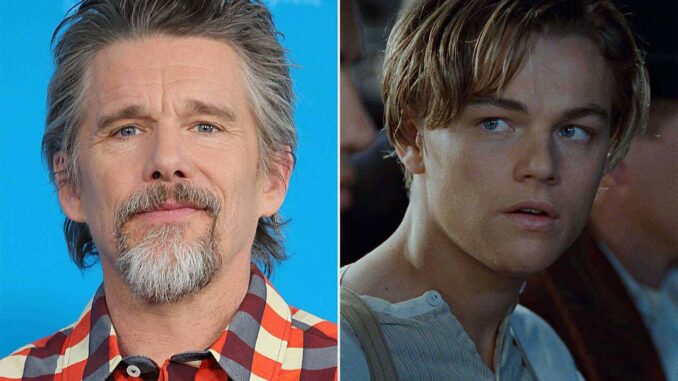
The Unchosen Ship: How Losing the Titanic Became Ethan Hawke’s North Star
In the grand, often capricious theatre of Hollywood, careers are forged not just by the roles one accepts, but by the ones one narrowly misses. Imagine a different tide, a different turn of the page in destiny’s script: Ethan Hawke, not Leonardo DiCaprio, standing at the bow of the Titanic, declaring himself king of the world. It’s a compelling, almost surreal alternate reality, one that Hawke himself has reflected upon with a disarming honesty, ultimately concluding that the unchosen ship was, in fact, the best thing that ever didn’t happen to him.
To understand why, one must first acknowledge the sheer, monolithic phenomenon that Titanic became. It wasn't merely a movie; it was a global event, a cultural touchstone that launched Leonardo DiCaprio into a supernova of superstardom. For the actor who became Jack Dawson, it meant the instant conferral of an iconic status, a face plastered on bedroom walls worldwide, and a career trajectory that bent irrevocably towards the blockbuster, the epic, the leading man. It was a gilded cage of immense fame, and while breathtakingly successful, it also came with an intensity of scrutiny and expectation that could either define or devour an artist.
At that time, Ethan Hawke was already a rising star, known for his thoughtful performances in films like Dead Poets Society and Before Sunrise. He possessed an intellectual curiosity, a poetic sensibility, and a nascent desire to delve deeper into the craft, not just the celebrity. He was a promising young actor, not yet a global heartthrob, and perhaps, not yet fully aware of the kind of artist he was destined to be. The sting of losing the Titanic role must have been sharp, a momentary iceberg of missed opportunity looming large in his path. Who wouldn't want to be part of a film that rewrites cinematic history?
But here’s where the wisdom of hindsight illuminates the path. Had Hawke landed the role, his career, too, would have been irrevocably altered. He might have been swept up in the same tide of instant, overwhelming fame, forever associated with the role of Jack, burdened by the expectation to replicate that level of success, that brand of romantic lead. The choices available to him might have narrowed, the pressure to maintain a certain image suffocating the more eclectic, character-driven actor within. He might have become a prisoner of his own success, constantly chasing the roar of the crowd rather than the quiet satisfaction of a truly challenging part.
Instead, free from the scorching spotlight of Titanic superstardom, Hawke embarked on a different voyage. He charted a course through the independent film landscape, cultivating a reputation not as a blockbuster hero, but as a fearless, versatile actor driven by artistic integrity. He took on roles that required depth, vulnerability, and often, a rejection of conventional Hollywood glamour. Think of his brooding turn in Gattaca, his nuanced collaboration in the Before trilogy with Richard Linklater and Julie Delpy—a partnership that itself became a testament to slow-burn artistry and enduring dialogue. He pushed boundaries as a writer and director, exploring the craft from all angles, never content to simply be a performer.
This unburdened path allowed him to evolve organically, to take risks without the fear of a billion-dollar box office watching his every move. He could fail, learn, and grow in a less public, more forgiving arena. He became known for his commitment to his craft, his intellectual curiosity, and his willingness to inhabit complex, sometimes morally ambiguous characters. Training Day showcased a grit that Titanic would never have allowed, Boyhood solidified his reputation for patient, long-term artistic commitment, and films like First Reformed proved his capacity for profound, searing performances.
Ethan Hawke’s career is a tapestry woven with threads of thoughtful choices, artistic collaboration, and a consistent refusal to be typecast. He built a career that is a marathon, not a sprint, a slow burn of credibility and respect that arguably would have been harder, if not impossible, to achieve had he been launched into the immediate, stratospheric fame of Titanic. He found his own North Star, not in the dazzling light of an iceberg-sized blockbuster, but in the steady glow of meaningful work.
In reflecting on this pivotal moment, Hawke isn’t expressing regret or resentment. He’s acknowledging a fundamental truth about artistic identity: what appears to be a loss can often be a profound liberation. Losing Titanic didn't sink his career; it allowed him to sail his own ship, guided by his own compass, towards a destination uniquely suited to his singular talent and artistic spirit. He didn't become king of the world on the deck of a doomed liner, but he became something arguably more enduring: an artist perpetually in pursuit of truth, depth, and the quiet satisfaction of a life well-crafted. And for Ethan Hawke, that was the best thing for him.